


3183 Active Guests

|
Get notified when this page is changed. |
|
|
|
|
|
|

|
|

|
|

|
|
|
3183 Active Guests |
|
|
|
|
|
|
|

|
|
|
|
|
|
|
|
||||||||||||||||||||||||||||

The National Wildlife Habitat Educational Program (WHEP) Contest is associated with a 4-H and FFA youth natural resource program dedicated to teaching wildlife and fisheries habitat management to junior and senior level (ages 8-19) youth in the United States. WHEP is a hands-on environmental education program. It conducts an annual contest where teams of 3-4 youth gather, usually in late July, at a different location each year. The following five paragraphs come directly from the WHEP website: WHEP started out as "Wildlife Judging," a state-wide program in Tennessee created by Jim Byford and Tom Hill from the Tennessee Agricultural Extension Service in 1978. The program soon grew to include other southeastern stats. The first regional contest was held in Mississippi in 1987. In 1989, "Wildlife Judging" went nationwide when the national event was held in West Virginia with the support of the U.S. Fish and Wildlife Service and the International Association of Fish and Wildlife Agencies. The program was officially named Wildlife Habitat Education Program (WHEP) in 1990, and the national contest was moved to different regions each year, exposing participants to wildlife habitats and practices unique to those regions. National contest sites have included the North Carolina Atlantic coast, the Prairie Pothole regions in North Dakota, the Texas Hill Country and the Idaho Rocky Mountains. The states hosting the contest starting in 1989 include:
In 1996, WHEP won The Wildlife Society's Conservation Education Award. It's reputation as a quality wildlife and fisheries educational experience for youth and adults attracted the attention of several additional national sponsors including U.S.Fish and Wildlife Service. WHEP also earned a solid reputation for being a 4-H program that fostered relationships between professional wildlife and fisheries biologists, volunteers, parents, youth, teachers, farmers and ranchers, as well as one that taught essential life skills such as oral and written communication and decision-making. WHEP helped youth strengthen their self-concept and character through interaction with other young people from their own state and different parts of the country. The 2011 WHEP Contest was held in Arkansas. Virginia had the first place winning 4-H team; Alabama placed second. For a listing of winning teams by year visit the WHEP website at http://www.whep.org and check the "previous contests" section. The 2012 National WHEP Contest was held in Kingsville, Texas on July 22-26. The WHEP contest is conducted over one full day and entails three individual events and two team events including the following areas: Wildlife Identification - participants compete as individuals and are tested on their ability to identify pre-determined wildlife species. Twenty photographs of wildlife species, which clearly show either a juvenile, adult, male or female of the species is presented to the participants. General Wildlife Knowledge - participants compete as individuals and are tested on their knowledge of topics ranging from wildlife habitat for select species to management practices that benefit wildlife. Wildlife Management Practice - participants compete as individuals and are taken to an outdoor site with defined boundaries and are asked to evaluate the quality of habitat for select wildlife species. Based on each participant's site evaluation, he/she is asked to recommend wildlife management practices that will benefit each select wildlife species. Written Wildlife Management Plan - participants compete as a team to write a 2-page management plan for an outdoor site with defined boundaries that meets objectives established in a field conditions sheet provided to each team. Oral Defense of Written Plan - although each team member completes this activity individually, their individual score counts toward the final team score for the written plan. Each individual team member appears before a panel of 2-3 judges and answers questions over a 5-minute period about their written plan, as well as general wildlife questions. CONTEMPORARY HISTORYThe WHEP contest continues to be popular and is an appropriate addition to the overall nationwide Wildlife Habitat Education Program which now includes about 10,000 4-H'ers, and the number continues to increase. While the U.S. Fish and Wildlife Service is a major sponsor of the WHEP contest, each year there are additional sponsors which vary due to the location of the event moving from state to state on an annual basis. For additional information on the WHEP Contest - future locations, national contest winners and how to get involved, visit the website: http://www.whep.org 
|
||||||||||||||||||||||||||||
|
| ||||||||||||||||||||||||||||
Compiled by National 4-H History Preservation Team. | ||||||||||||||||||||||||||||
|
| ||||||||||||||||||||||||||||
|
1902-2025 4-H All Rights Reserved | Terms & Conditions | Privacy Policy The 4-H Name and Emblem are protected by 18 USC 707 |
||||||||||||||||||||||||||||
